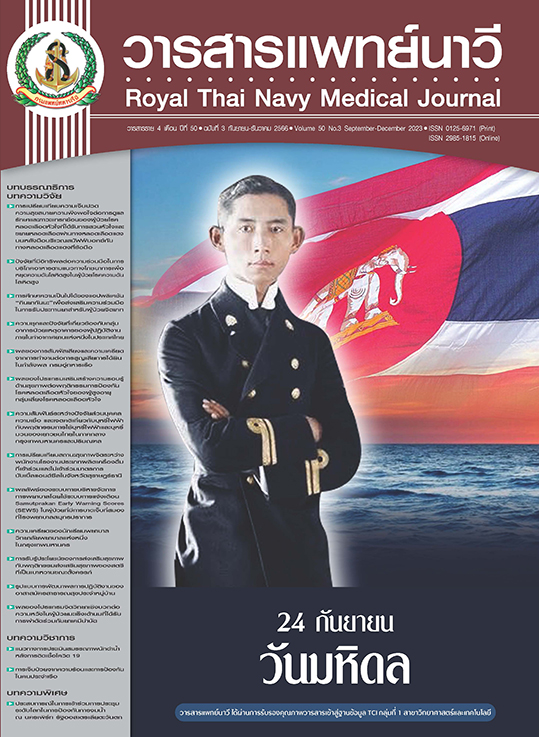Stress among Nursing Students in one Nursing College in Bangkok
Main Article Content
Abstract
The purposes of this descriptive research were to study the nursing students’ level of stress, to compare stress with learning at different year levels, personality and stress management styles. The sample consisted of 150 nursing students in one nursing college in Bangkok, from first to fourth year in academic year 2022, who were recruited by using a proportional stratified random sampling. The research instruments were questionnaires on stress and its related factors, personality and stress management styles. The data were analyzed using frequency, percentage, mean, standard deviation, one-way ANOVA, and independent t-test. The findings were as follows:
1. The overall level of stress among nursing students accounts for the same percentage. 30.7% at a very high level and 30.7% at slightly higher than normal level of stress. The majority of the nursing students had a compromising personality type (30.67%) and a stress management style that focused on resolving emotions (51.33%).
2. The 1st - 4th year nursing students had different levels of stress which was not statistically significant at the level of .05.
3. Nursing students with different personalities had different levels of stress which was statistically significant at the level of .05. It was found that the extroversion, agreeableness and conscientiousness personality type had different levels of stress with statistical significance at the level of .05.
4. Nursing students with different stress management styles had different levels of stress which was not statistically significant at the level of .05.
Article Details

This work is licensed under a Creative Commons Attribution-NonCommercial-NoDerivatives 4.0 International License.
References
Dorland NWA. Dorland‘s Illustrated Medical Dictionary. 28th ed. Philadelphia: W.B.Sauders; 1994.
Institute for Population and Social Research Mahidol University and the Health Promotion Foundation. Thai people's health 2022: Thai families in the COVID-19 crisis. Bangkok: Amarin Printing and Publishing; 2022. (in Thai.)
Chaleoykitti S, Chewsothon S, Butpunya Y. Effectiveness of the integrated academic service and teaching- learning arrangement in psychiatric nursing practicum course to psychiatric nursing practice competency in Army nurse. Journal of The Royal Thai Army Nurses 2017;18(3):144-52. (in Thai.)
Intaraprawat C. From student to profession. Nakhon Ratchasima: Student Affairs Suranaree University of Technology; 2015. (in Thai.)
Charoenwattanachokchai T. Motivation and personality traits influencing to purchase intention in health screening package; via internet in Bangkok and perimeter. [Master’s Thesis, Faculty of Applied Statistics]. National Institute of Development Administration. 2020. (in Thai.)
Nochit W, Yotthongdi N, Leksanga W, Manfak P. Factors predicting stress and stress management of bachelor program of nursing students. Academic Journal of Phetchaburi Rajabhat University 2020;10(1):118-28. (in Thai.)
Houythan S, Personality and stress of nursing students in college nursing, Ministry of Defense. [Master’s Thesis, Faculty of Science]. Chulalongkorn University;1991. (in Thai.)
Khamwong W, Plangpongpan S, Yamboonruang T. The relationships between levels of stress, causes of stress and stress management in nursing students of nursing colleges under the jurisdiction of Praboromarajchanok Institute for health workforce development. Journal of Health Science Research 2016;10(1):78-87. (in Thai.)
Yomaboot P, Cooper A. Factor structure and psychometric properties of the International Personality Item Pool; IPIP-NEO. Journal of Somdet Chaopraya Institute of Psychiatry 2016;10(2):36-49. (in Thai.)
Sornmanee P. The stress management for Practice teacher Faculty of Education Silpakorn University, Sanam Chandra Palace.[Master’s Thesis, Faculty of Education]. Silpakorn University; 2018. (in Thai.)
Department of Mental Health, Ministry of Public Health. Get to know stress. [Internet]. [cited 2022 August 4]; Available from https://dmh.go.th/news/error.asp. (in Thai.)
Kanchanawasri S, Srisuko D, Pitayanon T. Selection suitable statistic for research in social science. 5th ed. Bangkok: Chulalongkorn University; 2012. (in Thai.)
Thamnamsin K, Noitung S, Punyapet K, Sorat W. Factors affecting to stress among nursing students in a private nursing college, Bangkok. Journal of Health and Health Management 2021;7(1):60-75. (in Thai.)
Dangpiam N, Duangmanee A, Pariwat N, Wihokhan P, Leungsuwalai W, Tanasing S, et al. Factors related to happiness in learning among naval nurse students. Royal Thai Navy Medical 2023; 50(2):360-377. (in Thai.)
Jornkokgoud K, Rueboon W, Jairew W, Chantraand S, Ruengthip P. Neuroticism personality to relationship with the stress of programmers during COVID-19 pandemic. Journal of Roi Kaensarn Academi 2019;6(6):77-82. (in Thai.)
Ponpichai W, Uieng J. Study of stress and coping strategies of high school student in Muang district, Trang province. Narkbhutparitat Journal Nakhon Si Thammarat Rajabhat University 2018;10(Spec June-September):94-106. (in Thai.)


